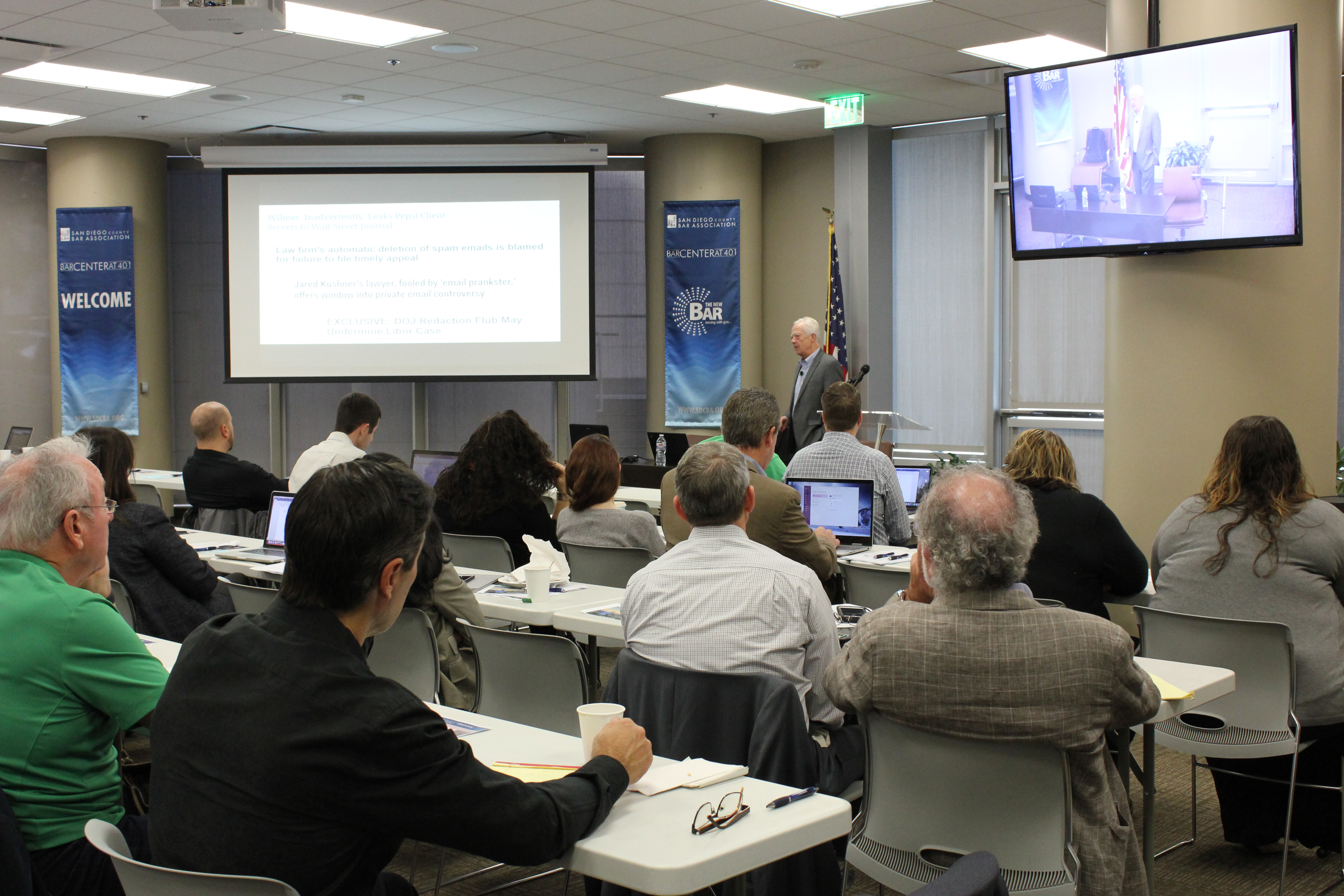
By Mike Finstad
If you didn’t get a chance to attend the SDCBA’s 2018 Law + Technology Summit presented with California Lawyers Association last month, here’s a summary of the highlights.
National tech blogger Bob Ambrogi opened up the two-day conference with a discussion on ethics and a lawyer’s duty to provide competent representation. Citing Model Rule 1.1, comment 8, Ambrogi warned of the growing importance that technology plays in our lives, and the ethical representation of clients. Comment 8 has been adopted in 28 states (not including California1), and lawyers are encouraged to keep up with the pace of technological change in order to provide competent representation to their clients.
In addition to the ethical duty of tech competence, Ambrogi noted that embracing technology is equally important for the business side of law practice. “Tech has dramatically changed but the practice of law has not,” said Ambrogi. “We’re at an inflection point,” where using technology isn’t just about competence but also what will separate winners and losers. “Lawyers who understand technology are the ones who will succeed, and those who don’t will get left behind…If you don’t understand Facebook and your practice revolves around divorce, your lack of tech knowledge is an immediate liability.”
Technology Tools in Practice
A post-lunch plenary session on the first day dealt solely with useful tablet apps for litigators, and was led by speakers Procopio E-Discovery Specialist, Christine Stansall, and Los Angeles family law attorneys Cari Pines and Alexa Wolff. Seethe list of apps that were discussed at this session (and others) at the end of this article.
The panel also discussed the challenges of getting technology into the courtroom. Cari Pines recalled a story about wanting to use an iPad and a certain app for one trial. To avoid any objections, she purchased five iPads, installed the app she wanted to use, and then gave a brand-new iPad to the judge and opposing counsel so that everyone was on the same page, so to speak. Getting judges (and law firm partners) to adopt new technology when time is scarce can be hard, recalled Pines, but the trick is to make everything super easy for everyone to accept. This includes choosing apps that are intuitive and similar to the apps and technology that judges are already using.
Cybersecurity and the Cloud for Lawyers
Perhaps the most fascinating lecture of the entire conference was given early Saturday morning by Dennis Garcia, Assistant General Counsel for Microsoft. Mr. Garcia discussed a range of issues relating to cloud computing and cybersecurity. As more law firms contemplate migration to the cloud, he gave advice on contract terms with cloud vendors, the potential impact of the EU’s General Data Protection Regulation (GDPR) on multinational firms, and discussed Microsoft’s landmark data privacy case that is set to be heard by the U.S. Supreme Court. Mr. Garcia also talked about how Microsoft’s 1300-lawyer in-house legal team organizes themselves using Office 365 products. One interesting fact: there are no telephones in their offices.
Using Technology in the Courtroom to Enhance Advocacy
The 2018 Law + Technology Summit wrapped up on Saturday afternoon with Hon. Eddie Sturgeon and personal injury lawyer Jeff Bennion, who co-paneled a session on Using Technology in the Courtroom to Enhance Advocacy. The discussion provided some great insight from both sides of the bench. Judge Sturgeon explained his reason for embracing technology. “For me, I’m very receptive to technology because it makes things easier for me.” But in his courtroom, the traditional rules of fair play are strictly enforced: “If the other side doesn’t stipulate, the parties can’t use it.” Bennion suggested using motions in limine before trial to include the use of technology, such as PowerPoint presentations and apps.
Judge Sturgeon used the example of cell phones to show that attitudes are changing about technology in the courtroom. Although once thought to be a nuisance, judges are increasingly seeing cell phones as tools that help lawyers advocate and produce better outcomes. “We’re trying to keep up.”
List of Noteworthy Tablet Apps for Trial Lawyers
- Trial Director
- Trial Pad
- DocReview Pad
- PDF Export
- Sanction
- TrialPad
- Trial Director
- BenchView — Used by some judges to view documents
- RavelLaw
- Sharefile
- PDF Export — Compare to Goodreader and PDF Reader
- NotesPlus
- BlinkList3 — Cliffnotes-like app that provides a 15-min summary books. Great for personal use but has other benefits
- Penultiment (pencil app) used with Evernote — highly recommended by the speakers
- CRMs — Firm Central, Practice Panther. The trick to choosing which CRM is the right one for your firm is knowing what your priorities are (e.g., collaboration, project management, billing, calendaring, etc.).
1 But see, California Formal Opinion 2015-193, regarding the “Duty to Supervise.”
Mike Finstad is a solo practitioner and chair of the SDCBA’s New Lawyer Forum.